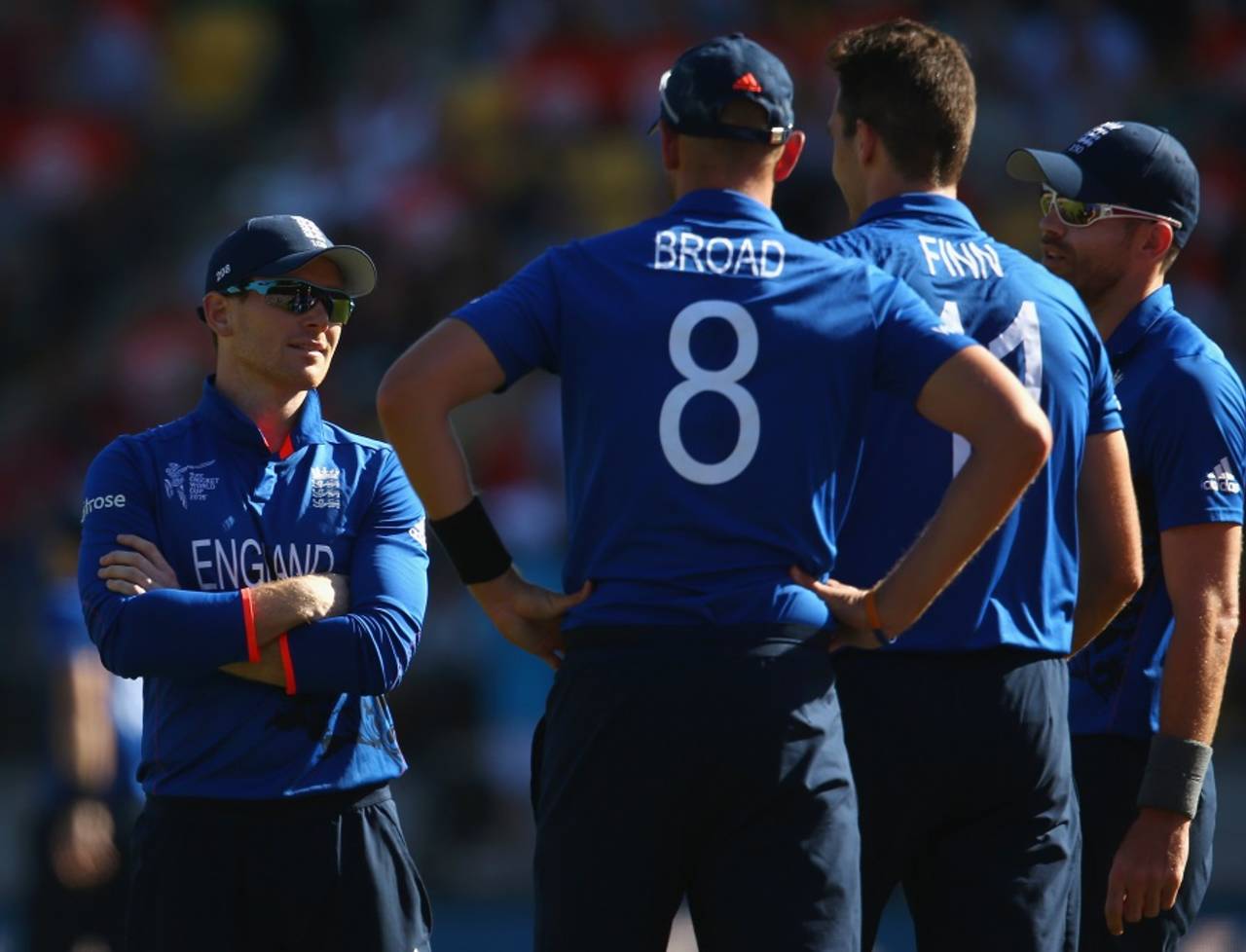Wenger's message to faltering England
England were hammered before England had even woken up - but all is not yet lost
Alan Gardner
20-Feb-2015

"Well, lads, at least we'll not get slated like the footballers..." • Getty Images
Where were you when English cricket was being wellied around Wellington? In bed, probably, sleeping through the nightmare. You might have cautiously reached for the phone when the alarm went off, checked the score with one eye still closed, discovered it was already a result and put the pillow back over your head. Rude awakenings? We've had some.
England fans following the team on the other side of the world will be well acquainted with this procedure. Barring shocks - a competent performance, say - whatever England get up to won't intrude much on the day. For some of us, abject hammerings on a foreign field are novocaine for the soul, a reminder of how things used to be before people got daft ideas about winning Ashes series in Australia. Something to roll the eyes and mutter about in the corridor at work. Although it's fair to say the final day of the 2006 Adelaide Test might have put one or two off their breakfast sausage.
Nevertheless, plenty will be outraged that England have had their muffins toasted twice inside a week. Geoffrey Boycott, that most prim and proper of observers, described the eight-wicket defeat as a "bit of a shock", which suggested that he has not been watching either England or New Zealand much recently. Michael Vaughan claimed in his Telegraph column that time is running out for Peter Moores, less than a year after he was brought in to clean up the previous mess. On Sky, Andrew Strauss went beyond his usual diplomatic brief and mentioned "crisis talks".
If that all sounds rather like football speak, it was perhaps fitting the subject came up in a couple of Premier League managers' press conferences, with Arsene Wenger and Steve Bruce both consulted. News on whether Moores thinks Arsenal should have recruited a defensive midfielder in January and if Hull have enough goals in them to beat the drop is now confidently expected when the timezones allow.
Of course, even those who have never watched Clockwise, the oft-quoted John Cleese film, know that it's not despair that is the problem, but hope. And really you would have needed a pure distillation of 2008 Barack Obama running through your veins in order to sustain much in the way of optimism about England's chances in Australia and New Zealand.
England at the World Cup is really a sort of thought experiment. Like Schrödinger's cat, they are theoretically alive even though you know they are dead. It's only when you open the box - usually around the quarter-final stage - that you are presented with the rather messy proof.
This was supposed to be the best-prepared England World Cup campaign in a generation but that rather went down the chute when they changed the captaincy around what felt like tea time the day before it started. Promoting Eoin Morgan was a gamble that many thought worth taking but it was a gamble all the same. England then came over all Luke Rhinehart and started rolling whatever dice they could get their hands on, bringing in Gary Ballance, shifting James Taylor down the order and taking Chris Woakes off new-ball duty. And this really was around tea time the day before the tournament started.
And yet, in another sense, England are right on track. Losing their opening two games against the in-form host nations was entirely predictable, even quite likely. The format of this World Cup - you may have heard it mentioned - means England could still get away with winning half of their group games to progress (albeit they are about 50% off in that regard right now). And while it's hard to do when hyper-ventilating into a paper bag, there might also be some room to praise the opposition - particularly the magnificent displays of Tim Southee and Brendon McCullum on Friday.
No, the time to start having a White Russian with your cornflakes will be if England lose to Scotland in Christchurch on Monday. Given their commitment to undermining ICC statements about how future World Cups should only be for "competitive" teams, this must be considered a real prospect. England have been defeated by Associates before but Moores really would need to engage in some football manager-style filibustering if they end up handing Scotland a first-ever World Cup win. That would call for celebration as well as condemnation but, as things stand, there won't be much bile left to go around.
Even then, England wouldn't necessarily be out of the competition, which might leave some pining for the swift kill inflicted on Roy Hodgson's team at last summer's football World Cup. Perhaps there are lessons to be learned from the, er, winter sport after all, which brings us back to Wenger and his response to how teams can recover after a heavy defeat.
"It is always difficult to make a separation of the emotional aspect and objective judgement of what happened," Wenger said, having rather cruelly joked that cricket was always on TV in England (oh, the irony - Wenger is a Sky subscriber, obviously). "What is interesting in sport is that it's practised by human beings, they are not robots, they have good and bad days. After a very bad day you can only get better. You have to be severe when you win and sometimes be helpful when the team loses."
So, there you have it, from the man who invented broccoli. The time to be get really angry is if England start winning. Now that really would be a reason to splutter into your morning brew.
Alan Gardner is an assistant editor at ESPNcricinfo. @alanroderick